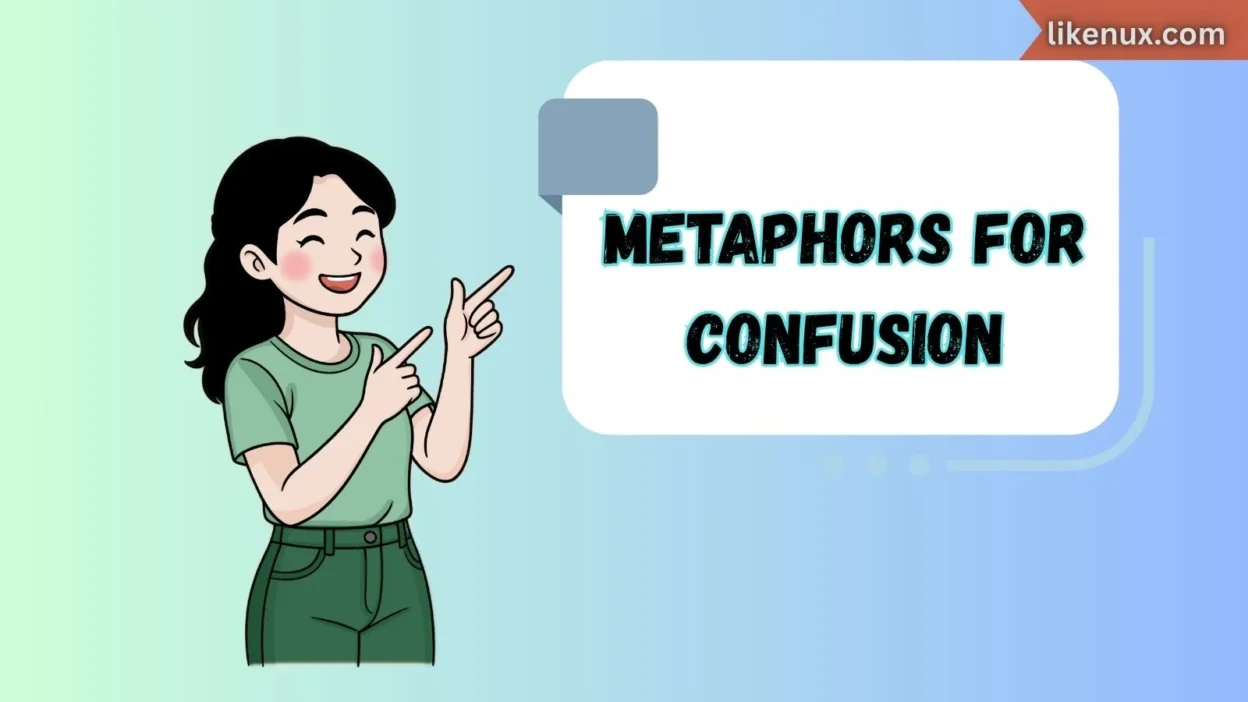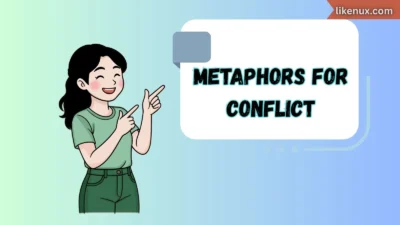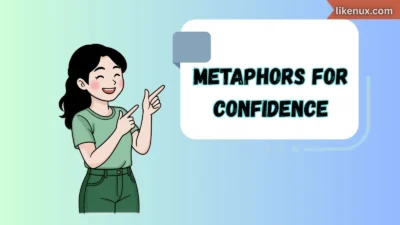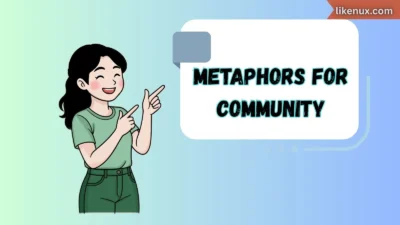Feeling confused is something everyone can relate to — that foggy state where nothing seems to fit, where your thoughts feel like tangled threads in your mind. In those moments, metaphors become powerful tools to express what words alone can’t. They bring warmth, relatability, and color to how we communicate. In this article, we’ll explore 25 metaphors for confusion, each explained with care and practical examples, helping you express yourself with authenticity and emotional depth.
Whether you’re a student, a writer, or simply someone trying to understand your feelings better, this guide will help you describe confusion with empathy and clarity. Let’s dive in!
1. Lost in a Fog
Meaning: Feeling unclear or uncertain about what’s happening.
Sentence: “After hearing the news, I felt lost in a fog, unable to make sense of anything.”
Best Use: Perfect for expressing emotional or mental disorientation.
Other Ways to Say: Bewildered, dazed, unclear, puzzled.
2. A Maze with No Exit
Meaning: A situation that feels complicated and hard to navigate.
Sentence: “Trying to understand those new policies felt like being in a maze with no exit.”
Best Use: Ideal for describing bureaucratic or logical confusion.
Other Ways to Say: Tangled, complex, tricky, convoluted.
3. Swimming Against the Current
Meaning: Struggling to move forward while everything feels against you.
Sentence: “Learning that new software felt like swimming against the current.”
Best Use: Great for describing difficulty in adapting or keeping up.
Other Ways to Say: Struggling, overwhelmed, resisting, stuck.
4. A Broken Compass
Meaning: Lacking direction or clarity in decision-making.
Sentence: “Without clear goals, I felt like a broken compass, turning endlessly without a true north.”
Best Use: Suitable for expressing loss of direction or uncertainty in choices.
Other Ways to Say: Disoriented, misguided, directionless, aimless.
5. A Puzzle Missing Pieces
Meaning: Having incomplete information that prevents full understanding.
Sentence: “Her explanation was like a puzzle missing pieces — I couldn’t grasp the full picture.”
Best Use: Perfect for describing incomplete or unclear information.
Other Ways to Say: Incoherent, partial, fragmented, unclear.
6. Caught in a Web
Meaning: Feeling trapped or entangled in confusion or lies.
Sentence: “He was caught in a web of conflicting emotions.”
Best Use: Describing emotional or situational confusion.
Other Ways to Say: Entangled, perplexed, ensnared, mixed-up.
7. A Jigsaw with No Picture
Meaning: Trying to understand something without guidance.
Sentence: “Studying that dense book felt like working on a jigsaw with no picture.”
Best Use: Useful for describing intellectual confusion.
Other Ways to Say: Guessing, uncertain, unsure, struggling.
8. A Storm in My Head
Meaning: Thoughts swirling chaotically, making it hard to focus.
Sentence: “After the argument, there was a storm in my head.”
Best Use: Ideal for emotional or mental turmoil.
Other Ways to Say: Turmoil, overwhelmed, unsettled, conflicted.
9. A Room Full of Mirrors
Meaning: Every reflection looks the same, making it hard to find truth or clarity.
Sentence: “Trying to figure out the truth was like being in a room full of mirrors.”
Best Use: When describing confusion caused by deception or overthinking.
Other Ways to Say: Confounded, puzzled, baffled, tricked.
10. Walking Through Thick Smoke
Meaning: Unable to see clearly what lies ahead.
Sentence: “His instructions were so unclear, it felt like walking through thick smoke.”
Best Use: Best for describing uncertain or unclear communication.
Other Ways to Say: Blinded, unsure, mystified, lost.
11. Tangled Wires
Meaning: Overlapping thoughts that don’t connect properly.
Sentence: “My thoughts were like tangled wires, sparking in every direction.”
Best Use: Describing cognitive or emotional overload.
Other Ways to Say: Conflicted, scattered, mixed-up, frazzled.
12. Drifting Without an Anchor
Meaning: Lacking stability or grounding in decisions.
Sentence: “After quitting my job, I felt drifting without an anchor.”
Best Use: Great for describing personal or professional uncertainty.
Other Ways to Say: Unsettled, directionless, unsteady, unsure.
13. Like Reading a Map in the Dark
Meaning: Trying to understand something with no clear guidance.
Sentence: “Deciphering those tax forms was like reading a map in the dark.”
Best Use: Perfect for technical or academic confusion.
Other Ways to Say: Unclear, obscure, complicated, baffling.
14. A Clouded Mirror
Meaning: Unable to see things clearly or objectively.
Sentence: “Grief made my mind a clouded mirror.”
Best Use: For emotional confusion or blurred judgment.
Other Ways to Say: Distorted, unclear, confused, uncertain.
15. Chasing Shadows
Meaning: Pursuing something unclear or unreachable.
Sentence: “Trying to find the truth felt like chasing shadows.”
Best Use: Describing the futility of overanalyzing or guessing.
Other Ways to Say: Misguided, distracted, lost, mistaken.
16. A Radio Out of Tune
Meaning: Struggling to connect with or understand something.
Sentence: “Our conversation felt like a radio out of tune, full of static and misunderstanding.”
Best Use: Great for miscommunication or relational confusion.
Other Ways to Say: Misaligned, unclear, garbled, out-of-sync.
17. A Torn Map
Meaning: Having partial guidance but missing critical details.
Sentence: “Without the full data, the plan was like a torn map.”
Best Use: Excellent for professional or research-related contexts.
Other Ways to Say: Incomplete, uncertain, fragmented, obscure.
18. The Lights Are On but Nobody’s Home
Meaning: Someone appears present but mentally checked out.
Sentence: “During the meeting, I was so tired — the lights were on but nobody’s home.”
Best Use: Describing mental fatigue or confusion.
Other Ways to Say: Spaced out, distracted, zoned out, unfocused.
19. A Whirlwind of Thoughts
Meaning: Too many thoughts spinning too fast to grasp.
Sentence: “Her mind was a whirlwind of thoughts, none of them making sense.”
Best Use: For emotional or mental overstimulation.
Other Ways to Say: Overthinking, anxious, scattered, overwhelmed.
20. Lost in Translation
Meaning: When understanding is lost between words or meanings.
Sentence: “Our ideas got lost in translation during the discussion.”
Best Use: Describing cultural or communicative confusion.
Other Ways to Say: Misunderstood, unclear, confused, mixed-up.
21. A Foggy Morning
Meaning: Things feel unclear but might become clearer with time.
Sentence: “The first day of training felt like a foggy morning.”
Best Use: Ideal for early stages of learning or new beginnings.
Other Ways to Say: Hazy, uncertain, unsure, blurry.
22. A Book in a Foreign Language
Meaning: Something incomprehensible due to lack of understanding.
Sentence: “Quantum physics looked like a book in a foreign language to me.”
Best Use: Great for describing intellectual confusion.
Other Ways to Say: Incomprehensible, obscure, unclear, confusing.
23. A Kaleidoscope of Thoughts
Meaning: Thoughts shifting constantly without clear focus.
Sentence: “My mind turned into a kaleidoscope of thoughts after the meeting.”
Best Use: Describing emotional or creative confusion.
Other Ways to Say: Distracted, scattered, restless, shifting.
24. Standing at a Crossroads
Meaning: Facing choices without knowing which direction to take.
Sentence: “After graduation, I was standing at a crossroads.”
Best Use: Perfect for major life decisions and uncertainty.
Other Ways to Say: Indecisive, torn, unsure, conflicted.
25. Like Static on a Screen
Meaning: Mental noise blocking clarity and focus.
Sentence: “When anxiety hits, my thoughts turn into static on a screen.”
Best Use: Describing mental confusion and emotional clutter.
Other Ways to Say: Distracted, noisy-minded, unsettled, chaotic.
FAQs
1. Why do metaphors help describe confusion better than plain words?
Metaphors connect feelings with imagery, allowing readers or listeners to understand your emotional state vividly. They turn abstract emotions into relatable experiences.
2. How can I use these metaphors in writing?
You can use them in essays, creative writing, speeches, or even casual conversations to express emotional or mental states more effectively.
3. Which metaphors work best for academic or professional writing?
Phrases like “a maze with no exit”, “a torn map”, or “a puzzle missing pieces” are professional and clear for analytical or business writing.
4. Can metaphors make communication more empathetic?
Absolutely! Metaphors bridge emotional gaps. They show understanding, warmth, and shared human experience — crucial for empathetic communication.
5. How do I know which metaphor fits my situation?
Think about what kind of confusion you’re feeling — emotional, intellectual, or situational. Then pick a metaphor that mirrors that feeling’s texture or energy.
Conclusion
Confusion is part of being human. It’s not weakness; it’s the mind’s way of searching for clarity. By using these 25 metaphors for confusion, you can express your inner thoughts with warmth, depth, and authenticity. Each metaphor adds nuance, helping your readers, listeners, or even yourself, understand the emotion behind the uncertainty.

Michael is a passionate thinker and visionary creator who turns ideas into action. With focus and integrity, he strives to make every project purposeful and inspiring.



